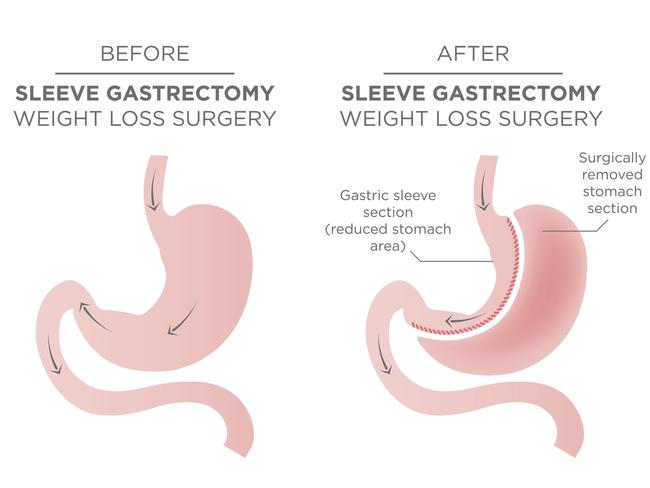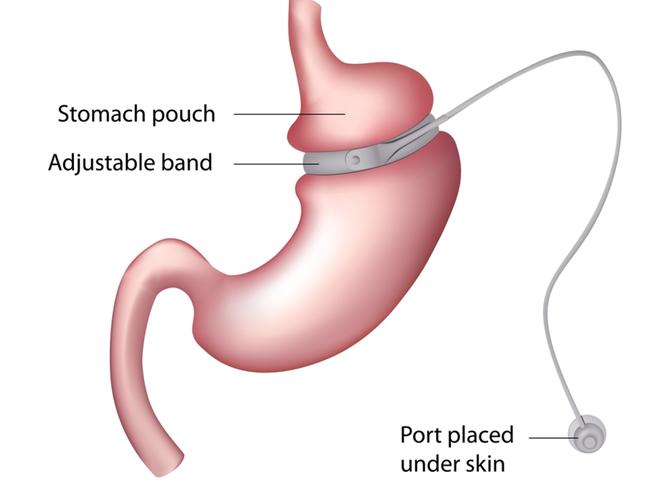Needle or knife: what to consider about long-term weight loss solutions
Obesity is so common that tens of thousands of Australians every year will choose between surgery or weight-loss drugs in the hope of a long-term solution. Here’s what a doctor says you should know.

Tens of thousands of Australians find themselves facing a big decision. In the battle against body fat where nothing seems to be working, should they choose surgery or stick with weight-loss injections? Which strategy is backed by the weight of evidence? What are the results, the risks and the costs of each approach?
If you’re struggling to shed extra kilograms – and keep them off – you’re not alone. Two-thirds of all adult Australians are overweight or obese and this statistic has barely changed for years. Our country has among the highest rates of obesity in the world. All of us seem to live in an “obesogenic environment”.
The conditions place a heavy burden on our economy, too, with governments spending more than $3bn a year on treating obesity-related health conditions. Overall, it is estimated that overweight and obesity result in total costs to the economy of a staggering $12bn a year.
Keeping your body fat in the normal range is fundamental to good health. Having an excess is linked to a wide range of conditions including cardiovascular disease and hypertension, diabetes, various cancers, liver disease, arthritis, obstructive sleep apnoea, infertility and mental health conditions – among many other problems.
If you’re finding long-term weight control difficult, don’t be too hard on yourself. Most doctors no longer view obesity as the result of a character flaw or lack of self-control. Indeed, according to the World Health Organisation, obesity is a multifactorial disease due to “obesogenic environments, psychosocial factors and genetic variants”.
Going it alone with weight loss is very difficult and likely to fail. Even if a burst of exercise and healthy eating work in the short term, sustained weight loss is a significant challenge. Obesity is a chronic condition and – like all chronic diseases – its management requires a long-term and multi-pronged approach that is different for each individual.
Because long-term weight control is so hard, large numbers of people will find themselves looking at more heavy-duty options. At present the key choices are weight-loss operations or long-term use of anti-obesity injections. While neither of these treatments works in isolation – lifestyle and dietary changes still need to happen – they usually offer the best outcomes overall.

For many years bariatric surgery was the definitive treatment for helping people with serious weight problems. These operations work by restricting the capacity of the stomach to hold food, making it difficult to overeat. This is achieved by removing a large part of the stomach to reduce its size or placing something around it to act like a girdle.
For the right person, surgery leads to loss of up to 25 per cent of body weight and, in most cases, the weight stays off in the long term. The procedures have been shown to improve obesity-related health problems such as diabetes. Most people who have the surgery are happy with the outcomes.
Recent research has shown that about 20,000 Australians undergo these surgical procedures each year, although that number is declining as weight-loss injections have come into play. Information from the Australian registry of weight-loss surgery shows the procedures are safe and the outcomes – in both the short and long terms – are very good.
The obvious issue with weight-loss surgery for most people is the cost. Having these procedures done in public hospitals can be difficult and, for people without private health insurance, out-of-pocket costs can be in the range of $20,000. It’s important to remember, though, that not treating obesity can be very expensive as well.

Studies of the economics of weight-loss surgery in the Australian setting paint a favourable picture. While the upfront costs can be high, the long-term savings – both for the individual having the procedure and the health system as a whole – look good.
The non-surgical option of weight-loss injections has taken the world by storm recently. Medications such as semaglutide – a GLP-1 agonist – initially were developed as a treatment for certain types of difficult-to-manage diabetes. It soon was discovered that the injections also had the side effect of significant weight loss.
The medications mimic the effects of a natural body chemical messenger, GLP-1, or glucagon-like peptide type 1, which has a role in our body to signal that we are full. Natural GLP-1 is metabolised within minutes and disappears from the system, losing its effect quickly. The synthetic medications were designed to last for hours or days and send a strong signal to the brain of not needing to eat any more food.
So profound was this effect that weight-loss medications were spruiked by social media influencers and supplies required by diabetes patients were snaffled by people wanting a weight-loss quick fix. The shortage was worldwide and acute, and threatened management of millions of legitimate patients.
Beyond the social media hype, our key question should be whether these injections work and, if they do, are they a true long-term solution for obesity. Since they are so new there is little information available about their long-term benefits and potential side effects. Caution should be the watchword at this stage.
The indications are looking very positive, though, and should give us cause for optimism. The medications have been shown to result in prompt weight loss and, for people with obesity-related conditions such as diabetes, improvements in health overall. The catch, though, is that it is likely use of the medications will have to be for the long haul.

The typical amount of weight loss for semaglutide is about 8kg across a year and ongoing use of the medications usually keeps this weight off. For men, about 5cm are lost from the waist. Combining medication use with exercise and broader lifestyle change is important – simply injecting medications and not making any other life changes is a poor strategy.
Use of these medications is not without risk – conditions such as pancreatitis and other gastrointestinal upsets can occur. Information about the balance of risk and benefit is still evolving and this information is keenly awaited. Red flags have come up regarding possible eye complications and perhaps muscle wasting, but definitive information will take time to come to light so ongoing caution is important.
The other key issue is the cost of medications, as many people have discovered. In Australia the Pharmaceutical Benefits Scheme will subsidise their cost for strictly defined conditions. Most people who wish to use the injections for weight loss alone will face costs of up to $600 a month or more.
If you are one of the millions of Australians dealing with weight problems, what is the best choice then? Would your needs best be served by taking injections for the long haul or looking to a surgical solution? Is it better to pay a lot upfront or take the financial pain across the long haul? Which approach is best for you?
Unfortunately there’s no simple answer – but it’s great to have effective options. Whatever you do, make sure you have a thorough and frank assessment with your doctor. Understand that few things work in isolation and that whether you choose the knife or the needle you’ll still have to make substantial life changes. The rewards to your physical and mental health – and your overall wellbeing – could be very large indeed.
Steve Robson is professor of obstetrics and gynaecology at the Australian National University and former president of the Australian Medical Association.
This column is published for information purposes only. It is not intended to be used as medical advice and should not be relied on as a substitute for independent professional advice about your personal health or a medical condition from your doctor or other qualified health professional.





To join the conversation, please log in. Don't have an account? Register
Join the conversation, you are commenting as Logout